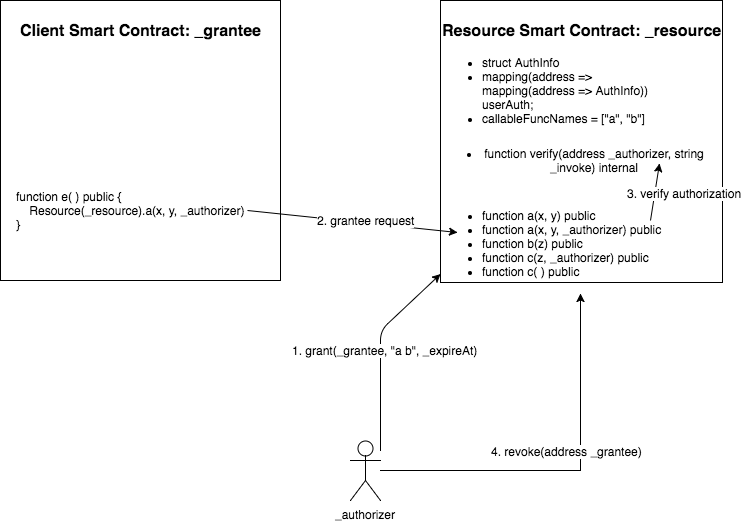| eip | title | author | discussions-to | status | type | category | created |
|---|---|---|---|---|---|---|---|
1207 |
DAuth Access Delegation Standard |
Xiaoyu Wang (@wxygeek), Bicong Wang (@Wangbicong) |
Stagnant |
Standards Track |
ERC |
2018-07-10 |
DAuth is a standard interface for accessing authorization delegation between smart contracts and users.
The DAuth protocol defines a set of standard API allowing identity delegations between smart contracts without the user's private key. Identity delegations include accessing and operating a user's data and assets contained in the delegated contracts.
The inspiration for designing DAuth comes from OAuth protocol that is extensively used in web applications. But unlike the centralized authorization of OAuth, DAuth works in a distributed manner, thus providing much more reliability and generality.
Resource owner: the authorizer
Resource contract: the contract providing data and operators
API: the resource contract APIs that the grantee contract can invoke
Client contract: the grantee contract using authorization to access and operate the data
Grantee request: the client contract calls the resource contract with the authorizer authorization
AuthInfo
struct AuthInfo {
string[] funcNames;
uint expireAt;
}Required - The struct contains user authorization information
funcNames: a list of function names callable by the granted contractexpireAt: the authorization expire timestamp in seconds
userAuth
mapping(address => mapping(address => AuthInfo)) userAuth;Required - userAuth maps (authorizer address, grantee contract address) pair to the user’s authorization AuthInfo object
callableFuncNames
string[] callableFuncNames;Required - All methods that are allowed other contracts to call
- The callable function MUST verify the grantee’s authorization
updateCallableFuncNames
function updateCallableFuncNames(string _invokes) public returns (bool success);Optional - Update the callable function list for the client contract by the resource contract's administrator
_invokes: the invoke methods that the client contract can call- return: Whether the callableFuncNames is updated or not
- This method MUST return success or throw, no other outcomes can be possible
verify
function verify(address _authorizer, string _invoke) internal returns (bool success);Required - check the invoke method authority for the client contract
_authorizer: the user address that the client contract agents_invoke: the invoke method that the client contract wants to call- return: Whether the grantee request is authorized or not
- This method MUST return success or throw, no other outcomes can be possible
grant
function grant(address _grantee, string _invokes, uint _expireAt) public returns (bool success);Required - delegate a client contract to access the user's resource
_grantee: the client contract address_invokes: the callable methods that the client contract can access. It is a string which contains all function names split by spaces_expireAt: the authorization expire timestamp in seconds- return: Whether the grant is successful or not
- This method MUST return success or throw, no other outcomes can be possible
- A successful grant MUST fire the Grant event(defined below)
regrant
function regrant(address _grantee, string _invokes, uint _expireAt) public returns (bool success);Optional - alter a client contract's delegation
revoke
function revoke(address _grantee) public returns (bool success);Required - delete a client contract's delegation
_grantee: the client contract address- return: Whether the revoke is successful or not
- A successful revoke MUST fire the Revoke event(defined below).
Grant
event Grant(address _authorizer, address _grantee, string _invokes, uint _expireAt);- This event MUST trigger when the authorizer grant a new authorization when
grantorregrantprocesses successfully
Revoke
event Revoke(address _authorizer, address _grantee);- This event MUST trigger when the authorizer revoke a specific authorization successfully
Callable Resource Contract Functions
All public or external functions that are allowed the grantee to call MUST use overload to implement two functions: The First one is the standard method that the user invokes directly, the second one is the grantee methods of the same function name with one more authorizer address parameter.
Example:
function approve(address _spender, uint256 _value) public returns (bool success) {
return _approve(msg.sender, _spender, _value);
}
function approve(address _spender, uint256 _value, address _authorizer) public returns (bool success) {
verify(_authorizer, "approve");
return _approve(_authorizer, _spender, _value);
}
function _approve(address sender, address _spender, uint256 _value) internal returns (bool success) {
allowed[sender][_spender] = _value;
emit Approval(sender, _spender, _value);
return true;
}Current Limitations
The current design of many smart contracts only considers the user invokes the smart contract functions by themselves using the private key. However, in some case, the user wants to delegate other client smart contracts to access and operate their data or assets in the resource smart contract. There isn’t a common protocol to provide a standard delegation approach.
Rationale
On the Ethereum platform, all storage is transparent and the msg.sender is reliable. Therefore, the DAuth don't need an access_token like OAuth. DAuth just recodes the users' authorization for the specific client smart contract's address. It is simple and reliable on the Ethereum platform.
This EIP introduces no backward compatibility issues. In the future, the new version protocol has to keep these interfaces.
Following is the DAuth Interface implementation. Furthermore, the example implementations of EIP20 Interface and ERC-DAuth Interface are also provided. Developers can easily implement their own contracts with ERC-DAuth Interface and other EIP.
-
ERC-DAuth Interface implementation is available at:
https://github.com/DIA-Network/ERC-DAuth/blob/master/ERC-DAuth-Interface.sol
-
Example implementation with EIP20 Interface and ERC-DAuth Interface is available at:
https://github.com/DIA-Network/ERC-DAuth/blob/master/eip20-dauth-example/EIP20DAuth.sol
Copyright and related rights waived via CC0.
